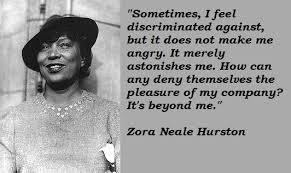“find your own voice & use it”
 I’ve had two opportunities to have my say recently. Last summer an editor at Publishers Weekly asked me to participate in a panel of “indie experts” but I declined because I didn’t feel I had enough expertise. The editor kindly suggested I write an article for him instead and it took me six months, but I finally got it done before Xmas. It went up yesterday; “How It Feels to Be Self-Published Me” was inspired by Zora Neale Hurston’s 1928 essay “How It Feels to Be Colored Me.” I had to cut about a third of it but I think my message comes through loud and clear, and it seems to be resonating with lots of folks online:
I’ve had two opportunities to have my say recently. Last summer an editor at Publishers Weekly asked me to participate in a panel of “indie experts” but I declined because I didn’t feel I had enough expertise. The editor kindly suggested I write an article for him instead and it took me six months, but I finally got it done before Xmas. It went up yesterday; “How It Feels to Be Self-Published Me” was inspired by Zora Neale Hurston’s 1928 essay “How It Feels to Be Colored Me.” I had to cut about a third of it but I think my message comes through loud and clear, and it seems to be resonating with lots of folks online:
Like Hurston, I remember the moment I went from being an admired, multi-award-winning debut picture book author to a largely unknown, ignored, and even pitied self-published author. In the past two years I have published sixteen books for young readers, but my books are not eligible for review in the major outlets, public libraries refuse to acquire them for their collections, and major awards are no longer a possibility. Despite the many voices clamoring for books that better reflect the nation’s diverse population, my indie titles that center on marginalized children are summarily dismissed. And there is little I can do about this marginalization; there are no penalties when gatekeepers reject books simply because they don’t come from a system that’s rigged against writers of color. So have I really found the success I deserve?
On Sunday I had the honor of being featured on Dr. Ebony Thomas’ blog The Dark Fantastic. Ebony is a professor in the Graduate School of Education at the University of Pennsylvania, and with her graduate students she has compiled a list of children’s books that promote social justice (#Kidlit4Justice). Her grad students also came up with some thought-provoking questions:
5) A notable contingent of tweeters for #kidlit4justice have asked the twitter sphere to donate both money and books to libraries. What role have libraries paid in fighting for justice in the past, and does a similar role exist for libraries today or in future fights for justice?
I grew up depending on libraries. My family didn’t have much money and we had no tradition of buying new books, but we all had library cards. The only diverse books in my library’s collection, however, were the ones that managed to win an award—like Roll of Thunder, Hear My Cry. I think the field of library science needs to evolve and diversify so that collections do the same. The kid lit community in general is dominated by middle-class white women—they make up the majority of editors, reviewers, librarians, teachers—and they need to ask themselves what they’ve done and/or are doing to perpetuate racial disparities. Citizens also need to let their elected officials know that library funding is important, especially since public libraries do so much more now than just circulate books. The Brooklyn Public Library has sponsored my author visits for years, and through them I’ve reached hundreds of kids. But the BPL won’t acquire self-published books, so that leaves the vast majority of my books out of reach for kids who rely on the library. The BPL has asked me to develop a workshop on self-publishing and I think that’s the way forward—I believe in community–based publishing and think libraries should take the lead in developing producers of books, not just consumers.
I concluded my PW essay with a line from one of Jayne Cortez’ poems, “Find Your Own Voice.” We should all follow her advice! I’m grateful for the chance to share my point of view, and for everyone who took the time to read and respond. Every time we speak up for ourselves, we build community…



